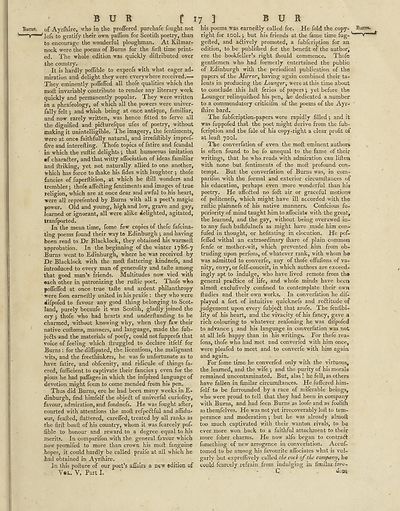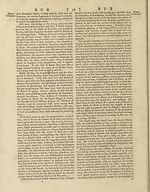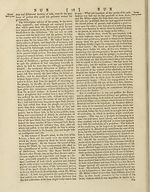Encyclopaedia Britannica, or, a Dictionary of arts, sciences, and miscellaneous literature : enlarged and improved. Illustrated with nearly six hundred engravings > Volume 5, BUR-CHI
(27) Page 17
Download files
Complete book:
Individual page:
Thumbnail gallery: Grid view | List view

BUR f 17 ] BUR
Bums, of Ayrflure, who in the proffered purchafe fought not
1 jcfs to gratify their own paflion for Scotifh poetry, than
to encourage the wonderful ploughman. At Kilmar¬
nock were the poems of Burns for the firft time print¬
ed. The whole edition was quickly diftributed over
the country.
It is hardly poffible to exprefs with what eager ad¬
miration and delight they were everywhere received.—
They eminently poffeffed all thofe qualities which the
moft invariably contribute to render any literary work
quickly and permanently popular. They were written
in a phrafeology, of which all the powers were univer-
fally felt; and which being at once antique, familiar,
and now rarely written, was hence fitted to ferve all
the dignified and pi&urefque ufes of poetry, without
making it unintelligible. The imagery, the fentiments,
were at once faithfully natural, and irrefiftibly impref-
five and interefting. Thofe topics of fatire and fcandal
in which the ruftic delights; that humorous imitation
•f chara&er, and that witty affociation of ideas familiar
and ftriking, yet not naturally allied to ono another,
which has force to (hake his fides with laughter •, thofe
fancies of fuperftition, at which he ftill wonders and
trembles ; thofe affe&ing fentiments and images of true
religion, which are at once dear and awful to his heart,
were all reprefented by Burns with all a poet’s magic
power. Old and young, high and low, grave and gay,
learned or ignorant, all were alike delighted, agitated,
tranfported.
In the mean time, fome few' copies of thefe fafeina-
ting poems found their way to Edinburgh ; and having
been read to Dr Blacklock, they obtained his warmeft
approbation. In the beginning of the winter 1786-7
Burns went to Edinburgh, where he was received by
Dr Blacklock with the moft flattering kindnefs, and
introduced to every man of generofity and tafte among
that good man’s friends. Multitudes now vied with
oach other in patronizing the ruftic poet. Thofe who
poffeffed at once true tafte and ardent philanthropy
were foon earneftly united in his praife : they who were
difpofed to favour any good thing belonging to Scot¬
land, purely becaufe it was Scotilh, gladly joined the
cry j thofe who had hearts and underftanding to be
charmed, without knowing why, when they faw their
native cuftoms, manners, and language, made the fub-
jeifts and the materials of poefy, could not fupprefs that
voice of feeling which ftruggled to declare itfelf for
Burns : for the diflipated, the licentious, the malignant
wits, and the freethinkers, he was fo unfortunate as to
have fatire, and obfeenity, and ridicule of things fa-
cred, fufficient to captivate their fancies 5 even for the
pious he had paffages in which the infpired language of
devotion might feem to come mended from his pen.
Thus did Burns, ere he had been many weeks in E-
dinburgh, find himfelf the object of univerfal curiofity,
favour, admiration, and fondnefs. He was fought after,
courted with attentions the moft refpedtful and aflidu-
ous, feafted, flattered, careffed, treated by all ranks as
the firft boaft of his country, whom it was fcarcely pof¬
fible to honour and reward to a degree equal to his
merits. In comparifon with the general favour which
now promifed to more than crown his moft fanguine
hopes, it could hardly be called praife at all which he
had obtained in Ayrfhire.
In this pofture of our poet’s affairs a new edition of
V«L. Vf Part I.
his poems was earneftly called for. He fold the copy- Burns,
right for tool, j but his friends at the fame time fug- "
gefted, and actively promoted, a fubfeription for an
edition, to be publiflied for the benefit of the author,
ere the bookfeller’s right thould commence. Thofe
gentlemen who had formerly entertained the public
of Edinburgh with the periodical publication of the
papers of the Mirror, having again combined their ta¬
lents in producing the Lounger, were at this time about
to conclude this laft feries of papers*, yet before the
Lounger relinquiflied his pen, he dedicated a number
to a commendatory criticifm of the poems of the Ayr-
fliire bard.
The fubfeription-papers were rapidly filled ; and it
was fuppofed that the poet might derive from the fub¬
feription and the fale of his copy-right a clear profit of
at leaft 700I.
The converfation of even the moft eminent authorfe
is often found to be fo unequal to the fame of their
writings, that he who reads with admiration can liften
with none but fentiments of the moft profound con¬
tempt. But the converfation of Burns was, in com¬
parifon with the formal and exterior eircumftances of
his education, perhaps even more wonderful than his
poetry. He affected no foft air or graceful motions
of politenefs, which might have ill accorded with the
ruftic plainnefs of his native manners. Confcious fu-
periority of mind taught him to affociate with the great,
the learned, and the gay, without being overawed in¬
to any fuch baftrfulnefs as might have made him con-
fufed in thought, or hefitating in elocution. He pof¬
feffed withal an extraordinary {hare of plain common
fenfe or mother-wit, which prevented him from ob¬
truding upon perfons, of whatever rank, with whom ho
was admitted to converfe, any of thofe effufions of va¬
nity, envy, or felf-conceit, in which authors are exceed¬
ingly apt to indulge, who have lived remote from tha
general pra&ice of life, and whofe minds have been
almoft exclufively confined to contemplate their own
ftudies and their own works. In converfation he dif-
played a fort of intuitive quicknefs and reftitude of
judgement upon every fubjedt that arofe. The fenfibi-
lity of his heart, and the vivacity of his fancy, gave a
rich colouring to whatever reafoning he was difpofed
to advance j and his language in converfation was not
at all lefs happy than in his writings. For thefe rea-
fons, thofe who had met and converfed with him once,
were pleafed to meet and to converfe with him again
and again.
For fome time he converfed only with the virtuous,
the learned, and the wife j and the purity of his morals
remained uncontaminated. But, alas ! he fell, as others
have fallen in fimilar circumftances. He fuffered him¬
felf to be furrounded by a race of miferable beings,
who were proud to tell that they had been in company
with Burns, and had feen Burns as loofe and as foolifti
as themfelves. He was not yet irrecoverably loft to tem¬
perance and moderation j but he was already almoft
too much captivated with their wanton rivals, to be
ever more won back to a faithful attachment to their
more fober charms. He now alfo began to contract
fomething of new arrogance in converfation. Accuf-
tomed to be among his favourite affociates what is vul¬
garly but expreflively called the cock of the company, he
could fcarcely refrain from indulging in fimilar free-
C do®,
Bums, of Ayrflure, who in the proffered purchafe fought not
1 jcfs to gratify their own paflion for Scotifh poetry, than
to encourage the wonderful ploughman. At Kilmar¬
nock were the poems of Burns for the firft time print¬
ed. The whole edition was quickly diftributed over
the country.
It is hardly poffible to exprefs with what eager ad¬
miration and delight they were everywhere received.—
They eminently poffeffed all thofe qualities which the
moft invariably contribute to render any literary work
quickly and permanently popular. They were written
in a phrafeology, of which all the powers were univer-
fally felt; and which being at once antique, familiar,
and now rarely written, was hence fitted to ferve all
the dignified and pi&urefque ufes of poetry, without
making it unintelligible. The imagery, the fentiments,
were at once faithfully natural, and irrefiftibly impref-
five and interefting. Thofe topics of fatire and fcandal
in which the ruftic delights; that humorous imitation
•f chara&er, and that witty affociation of ideas familiar
and ftriking, yet not naturally allied to ono another,
which has force to (hake his fides with laughter •, thofe
fancies of fuperftition, at which he ftill wonders and
trembles ; thofe affe&ing fentiments and images of true
religion, which are at once dear and awful to his heart,
were all reprefented by Burns with all a poet’s magic
power. Old and young, high and low, grave and gay,
learned or ignorant, all were alike delighted, agitated,
tranfported.
In the mean time, fome few' copies of thefe fafeina-
ting poems found their way to Edinburgh ; and having
been read to Dr Blacklock, they obtained his warmeft
approbation. In the beginning of the winter 1786-7
Burns went to Edinburgh, where he was received by
Dr Blacklock with the moft flattering kindnefs, and
introduced to every man of generofity and tafte among
that good man’s friends. Multitudes now vied with
oach other in patronizing the ruftic poet. Thofe who
poffeffed at once true tafte and ardent philanthropy
were foon earneftly united in his praife : they who were
difpofed to favour any good thing belonging to Scot¬
land, purely becaufe it was Scotilh, gladly joined the
cry j thofe who had hearts and underftanding to be
charmed, without knowing why, when they faw their
native cuftoms, manners, and language, made the fub-
jeifts and the materials of poefy, could not fupprefs that
voice of feeling which ftruggled to declare itfelf for
Burns : for the diflipated, the licentious, the malignant
wits, and the freethinkers, he was fo unfortunate as to
have fatire, and obfeenity, and ridicule of things fa-
cred, fufficient to captivate their fancies 5 even for the
pious he had paffages in which the infpired language of
devotion might feem to come mended from his pen.
Thus did Burns, ere he had been many weeks in E-
dinburgh, find himfelf the object of univerfal curiofity,
favour, admiration, and fondnefs. He was fought after,
courted with attentions the moft refpedtful and aflidu-
ous, feafted, flattered, careffed, treated by all ranks as
the firft boaft of his country, whom it was fcarcely pof¬
fible to honour and reward to a degree equal to his
merits. In comparifon with the general favour which
now promifed to more than crown his moft fanguine
hopes, it could hardly be called praife at all which he
had obtained in Ayrfhire.
In this pofture of our poet’s affairs a new edition of
V«L. Vf Part I.
his poems was earneftly called for. He fold the copy- Burns,
right for tool, j but his friends at the fame time fug- "
gefted, and actively promoted, a fubfeription for an
edition, to be publiflied for the benefit of the author,
ere the bookfeller’s right thould commence. Thofe
gentlemen who had formerly entertained the public
of Edinburgh with the periodical publication of the
papers of the Mirror, having again combined their ta¬
lents in producing the Lounger, were at this time about
to conclude this laft feries of papers*, yet before the
Lounger relinquiflied his pen, he dedicated a number
to a commendatory criticifm of the poems of the Ayr-
fliire bard.
The fubfeription-papers were rapidly filled ; and it
was fuppofed that the poet might derive from the fub¬
feription and the fale of his copy-right a clear profit of
at leaft 700I.
The converfation of even the moft eminent authorfe
is often found to be fo unequal to the fame of their
writings, that he who reads with admiration can liften
with none but fentiments of the moft profound con¬
tempt. But the converfation of Burns was, in com¬
parifon with the formal and exterior eircumftances of
his education, perhaps even more wonderful than his
poetry. He affected no foft air or graceful motions
of politenefs, which might have ill accorded with the
ruftic plainnefs of his native manners. Confcious fu-
periority of mind taught him to affociate with the great,
the learned, and the gay, without being overawed in¬
to any fuch baftrfulnefs as might have made him con-
fufed in thought, or hefitating in elocution. He pof¬
feffed withal an extraordinary {hare of plain common
fenfe or mother-wit, which prevented him from ob¬
truding upon perfons, of whatever rank, with whom ho
was admitted to converfe, any of thofe effufions of va¬
nity, envy, or felf-conceit, in which authors are exceed¬
ingly apt to indulge, who have lived remote from tha
general pra&ice of life, and whofe minds have been
almoft exclufively confined to contemplate their own
ftudies and their own works. In converfation he dif-
played a fort of intuitive quicknefs and reftitude of
judgement upon every fubjedt that arofe. The fenfibi-
lity of his heart, and the vivacity of his fancy, gave a
rich colouring to whatever reafoning he was difpofed
to advance j and his language in converfation was not
at all lefs happy than in his writings. For thefe rea-
fons, thofe who had met and converfed with him once,
were pleafed to meet and to converfe with him again
and again.
For fome time he converfed only with the virtuous,
the learned, and the wife j and the purity of his morals
remained uncontaminated. But, alas ! he fell, as others
have fallen in fimilar circumftances. He fuffered him¬
felf to be furrounded by a race of miferable beings,
who were proud to tell that they had been in company
with Burns, and had feen Burns as loofe and as foolifti
as themfelves. He was not yet irrecoverably loft to tem¬
perance and moderation j but he was already almoft
too much captivated with their wanton rivals, to be
ever more won back to a faithful attachment to their
more fober charms. He now alfo began to contract
fomething of new arrogance in converfation. Accuf-
tomed to be among his favourite affociates what is vul¬
garly but expreflively called the cock of the company, he
could fcarcely refrain from indulging in fimilar free-
C do®,
Set display mode to:
![]() Universal Viewer |
Universal Viewer | ![]() Mirador |
Large image | Transcription
Mirador |
Large image | Transcription
Images and transcriptions on this page, including medium image downloads, may be used under the Creative Commons Attribution 4.0 International Licence unless otherwise stated. ![]()
| Permanent URL | https://digital.nls.uk/192984620 |
|---|
| Attribution and copyright: |
|
|---|
| Description | Ten editions of 'Encyclopaedia Britannica', issued from 1768-1903, in 231 volumes. Originally issued in 100 weekly parts (3 volumes) between 1768 and 1771 by publishers: Colin Macfarquhar and Andrew Bell (Edinburgh); editor: William Smellie: engraver: Andrew Bell. Expanded editions in the 19th century featured more volumes and contributions from leading experts in their fields. Managed and published in Edinburgh up to the 9th edition (25 volumes, from 1875-1889); the 10th edition (1902-1903) re-issued the 9th edition, with 11 supplementary volumes. |
|---|---|
| Additional NLS resources: |
|

